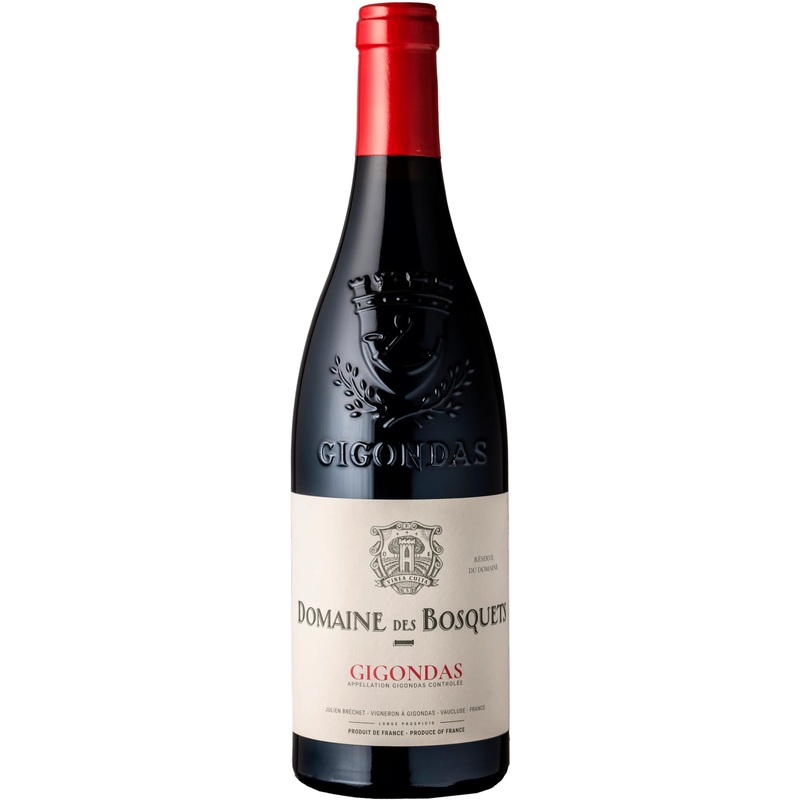Red Wine: 2021 | Domaine des Bosquets | Gigondas
Impressive and charming nose with balanced and rich flavors. Great elegance and length on the finish.
Order from the Largest & Most Trusted Premium Spirits Marketplace!
Featured in
- ROLLING STONE
- MEN'S JOURNAL
- US WEEKLY
NOTICE: Many other small liquor store sites may end up cancelling your order due to the high demand, unavailability or inaccurate inventory counts. We have partnerships consisting of a large network of licensed retailers from within the United States, Europe and across the world ensuring orders are fulfilled.
Producer: Domaine des Bosquets
Vintage: 2021
Size: 750ml
ABV: 14.5%
Varietal: Southern Rhone Red Blend
Country/Region: France, Rhone
Impressive and charming nose with balanced and rich flavors. Great elegance and length on the finish.
Producer Information
Much like many of the appellations of the southern Rhne, the wines of Gigondas are based on the Grenache grape. It tends to rusticity if yields are not checked or if it is vinified carelessly. It is supported by Syrah and Mourvdre with smaller amounts of various other varieties. There are two types of wine made in Gigondas, red and ros, but the production of ros is so small its mainly an academic point. Gigondas is red wine country. While you can find some white varieties in the vineyards, they are either bottled as Ctes-du-Rhne Blanc or co-fermented with the red grapes to make Gigondas red and ros wines. Domaine des Bosquets has deep historical roots in Gigondas. It was first mentioned as a vineyard site in 1376. Bosquets means a wooded grove, which is an apt name for many of the vineyards one finds high up in the Dentelles isolated and surrounded by forest and scrub. The oldest surviving buildings on the property, constructed in 1644 under Jean de Rivire Seigneur de Lavals direction, are comprised of a defensive tower, protective walls, and a solidly built provenal farmhouse. All have thick walls testifying to the need for protection against the cold winds of winter, the heat of summer, and the risks of living in such a remote corner of France. In 1674 the estate was inherited by the Chauvet family, who ran the property for many generations. In the 19th century, the estate passed through Eugne Raspails hands, who reorganized many of the vineyard plots and terraced portions of them. In 1961 Gabriel Meffre discovered that Domaine des Bosquets was for sale. Motivated by the potential and history of the estate and his love of his wife Juliette, a descendant of the Chauvet family, he purchased Domaine des Bosquets to bring it back into the family. The property Gabriel and Juliette had purchased was in some state of disrepair. The earlier work of Eugne Raspail was unfinished but following in his footsteps, they completed the reorganization of the vineyards, most notably finishing the terraces that separated two vineyards sites that would become La Colline and Le Plateau. Many of the vines that exist today at Domaine des Bosquets were planted by Gabriel and Juliette, relying on their friendship with the Reynaud of Chteau Rayas for budwood to replant much of the Grenache and Syrah and expanding the plantings to the estates current size of 26 hectares. When Gabriel died in 1987, Domaine des Bosquets passed to his daughter Sylvette and Sylvettes son Laurent Brechet. In 1995 Laurent built a fermentation room and cellar at Domaine des Bosquets before that time the grapes were sent to Gabriel Meffres ngoce operation in Gigondas and later they were fermented and aged at Chteau de Vaudieu in Chteauneuf-du-Pape. The most recent chapter of Domaine des Bosquets history began in 2010 when Julien Brechet, Laurents younger brother, took charge of the property. With little in the way of technical training, Laurent sent him to Chteau de Pibarnon in Bandol to begin his training before finishing his informal studies at Chteau de Vaudieu. Julien considers 2015 to be his first independent vintage. While Philippe and Laurent were available to answer questions, he was left largely on his own. With each successive vintage that we taste, we are astounded that wines that were so remarkable when we first added them to our portfolio just keep getting better.

